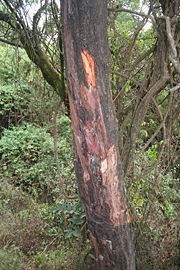Pygeum Prunus africanum
- Common Names
- Pygeum
- Botanical Name
- Prunus africanum
- Syn. P. africana
- Family
- ROSACEAE
Medicinal Uses & Benefits of Pygeum
![]() How to Use|
Side Effects |
Plant & Garden|
How to Use|
Side Effects |
Plant & Garden|
- Medicinal Uses: * African
* Libido
* Prostate
- Parts Used: bark
How to Use: Pygeum

Pygeum is often combined with
saw palmetto for prostate health
The terpenes in pygeum have an anti-swelling effect. Terpenes are present in many plants that produce fragrant essential oils. Prostaglandins are inflammatory hormones that tend to accumulate in the prostates of men with BPH. Research indicates that the phytosterols in pygeum interfere with the formation of these prostaglandins, helping to reduce inflammation and swelling of the prostate. When taken correctly, pygeum is considered one of the safest herbs used for male health, and often is combined with saw palmetto for maximum results.
Preparation Methods & Dosage :One hundred to 200 milligrams of a standardized supplement daily, Tinctures. Pygeum can be used with saw palmetto, stinging nettle root, and/or bee pollen to treat benign prostatic hyperplasia, and made into hair loss prevention shampoos with saw palmetto and stinging nettle root.
Pygeum Side Effects: Non-toxic, but can cause nausea in some cases.
Plant Description
Pygeum is an evergreen tree in the rose family growing up to 150 feet (50 m) tall, found across Africa at elevations of 3,000 feet (1,000 m) or higher. Sometimes referred to as the African Cherry because of its close relationship to the cherry tree, and like the cherry it's a member of the rose family .The dull gray-brown bark of this towering evergreen is the part used for traditional medicinal purposes by indigenous peoples who pulverized the bark, and used it as a tea to treat urinary tract infections. Pygeum has become an endangered species in parts of Africa because of the high demand.
Regional Traditions :African *
- Among 2351 newly-presenting LUTS/BPH patients in 6 European countries, significant improvements were seen in 43% of patients on phytotherapy with Serenoa repens or Pygeum africanum compared to 57% of those on finasteride and 68% on alpha-blockers. Hutchison 2007
- A number of short-term randomised trials and some meta-analyses suggest clinical efficacy and good tolerability of Serenoa repens and Pygeum africanum, products with high concentrations of beta-sitosterol, in treating lower urinary tract symptoms and benign prostatic hyperplasia. Dreikorn 2002











